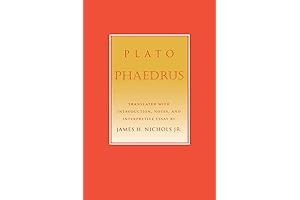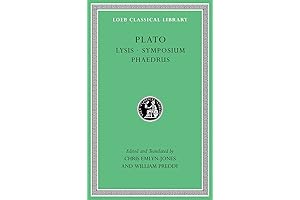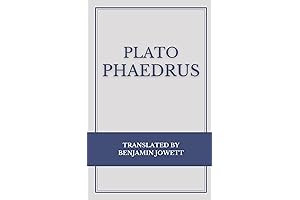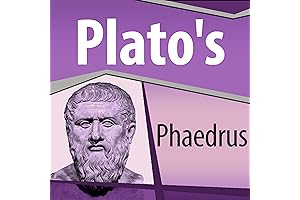· phaedrus · 12 min read
Plato Phaedrus: A Masterpiece of Philosophy and Rhetoric
Plato's acclaimed dialogue encapsulates a profound discussion between Phaedrus and Socrates on love, beauty, rhetoric, and the search for knowledge.
Plato's Phaedrus is a profound philosophical text, exploring themes of love, beauty, rhetoric, and the ascent to knowledge. Phaedrus presents a discourse on love and desire, divided into two distinctive sections, while Socrates delivers a counter-speech explaining the true nature of love and enlightenment. This classic text delves into rhetoric, the nature of the soul and the pursuit of wisdom, making it an invaluable resource for classicists and modern readers alike.
Overview

PROS
- In-depth analysis of Plato's philosophical ideas on love, beauty, and rhetoric.
- Clear and concise explanation of the dialogue's structure and arguments.
CONS
- May be challenging for readers unfamiliar with Plato's other works.
- Some sections could benefit from more detailed examples.
Plato's Phaedrus, presented in this Hackett Classics edition, offers a profound exploration of the interconnected themes of love, beauty, and rhetoric.
The dialogue, set in a picturesque meadow outside Athens, engages in a lively debate between Socrates and Phaedrus, delving into the nature of love and its transformative power. Plato masterfully crafts a multifaceted discussion, examining the role of rhetoric in both seduction and the pursuit of truth. This edition provides a comprehensive analysis of the dialogue, making it an invaluable resource for students, scholars, and anyone seeking to deepen their understanding of Plato's philosophy.

PROS
- Illuminating insights into the nature of rhetoric and its powerful effects
- Thought-provoking examination of love, beauty, and the pursuit of knowledge
CONS
- May require background knowledge in philosophy for full comprehension
- Somewhat dated language and writing style for some readers
Journey into the depths of Plato's "Phaedrus" and unravel the profound concepts of rhetoric and love that have captivated readers for centuries. Through the dialogue between Socrates and Phaedrus, Plato explores the nature of speech and its ability to persuade and inspire. The work delves into the delicate balance between reason and emotion, examining the use of rhetoric as a tool for enlightenment or manipulation.
Plato's Phaedrus further delves into the enigmatic nature of love, positing the existence of four types: the celestial, which leads to the pursuit of wisdom and truth; the intellectual, which is based on physical beauty; the procreative, which is rooted in physical desire; and the political, which is characterized by friendship and mutual respect. By exploring these ideas, Plato challenges conventional notions of love and encourages readers to seek a higher understanding of its transformative power.

PROS
- Plato's Phaedrus: A Philosophical Exploration of Rhetoric and Love
- Elucidates Plato's Views on the Nature of Rhetoric and Its Ethical Implications
- Offers Insights into the Meaning of Beauty and the Role of Love in Achieving Wisdom
CONS
- Can be challenging for readers unfamiliar with Plato's Philosophy
- Certain Passages Require Careful Reading to Comprehend the Depth of Plato's Argumentation
Plato's Phaedrus (Oxford World's Classics) invites you on an intellectual journey into the enigmatic world of rhetoric and love. With its meticulous translation and insightful introduction by C.J. Rowe, this edition offers a profound and accessible exploration of Plato's seminal work.
Through the dialogue between Socrates and Phaedrus, Plato delves into the intricate nature of rhetoric, questioning its true purpose and ethical implications. He examines the power of words to persuade and deceive, while also exploring the transformative potential of love in guiding us towards wisdom and truth. Rowe's commentary provides invaluable context and analysis, helping readers navigate the complexities of Plato's thought and appreciate its enduring relevance.

PROS
- Comprehensive and authoritative translation by renowned scholar Alexander Nehamas
- Enriching notes, glossary, appendices, and interpretive essay provide a deeper understanding of the text
CONS
- May require a foundational knowledge of ancient Greek philosophy for full appreciation
Plato's Phaedrus is a profound and thought-provoking dialogue that delves into the nature of love, rhetoric, and the soul. This translation, meticulously crafted by Alexander Nehamas, presents the text with unparalleled clarity and insight.
The extensive notes, glossary, appendices, and interpretive essay illuminate the complex ideas presented in the dialogue. Nehamas's erudite analysis guides readers through Plato's exploration of love as an ascending force that leads to contemplation of the divine. The significance of rhetoric in shaping our understanding of truth and morality is also expertly examined, highlighting the enduring relevance of Phaedrus to contemporary discussions.

PROS
- Captivating exploration of the power of rhetoric and the pursuit of truth
- Thought-provoking dialogue format stimulates critical thinking and philosophical inquiry
CONS
- Archaic language and concepts may require prior knowledge or research
- Certain sections can be dense and challenging for casual readers
Plato's Phaedrus stands as a monumental work that transcends the boundaries of time, exploring the multifaceted nature of rhetoric, truth, beauty, and the immortal soul. Through the captivating dialogue between Socrates and Phaedrus, Plato masterfully dissects the art of persuasion, unveiling its potential for both enlightenment and manipulation.
Phaedrus challenges us to contemplate the complexities of language and its ability to shape our understanding of the world. Plato delves into the nature of love, the pursuit of wisdom, and the eternal struggle between the physical and the spiritual realms. His insights resonate deeply, offering invaluable lessons for aspiring communicators, philosophers, and anyone seeking to unravel the mysteries of human existence. Immerse yourself in the timeless wisdom of Phaedrus and embark on an intellectual odyssey that will ignite your mind and leave an indelible mark on your philosophical journey.

PROS
- Provides a comprehensive collection of Plato's influential works on love, beauty, and the pursuit of knowledge.
- Features insightful annotations and introductions that enhance understanding of the texts.
CONS
- Some readers may find the language and philosophical concepts challenging to navigate.
- Lacks modern commentary and analysis, which could be beneficial for contemporary readers.
Plato's 'Lysis. Symposium. Phaedrus' is an invaluable volume that brings together three of the philosopher's most significant dialogues. These works explore profound themes of love, beauty, and the nature of knowledge, offering a glimpse into Plato's philosophical system.
The 'Lysis' examines the nature of friendship and love, questioning whether it is based on virtue or pleasure. The 'Symposium' delves into the concept of love, defining its different forms and exploring its transformative power. Finally, the 'Phaedrus' discusses the nature of rhetoric and the role of inspiration in intellectual pursuits. Through these dialogues, Plato challenges conventional notions and invites readers to engage in philosophical inquiry.

PROS
- Delves profoundly into the nature of love, beauty, and the power of words.
- Presents a captivating dialogue between Socrates and Phaedrus, engaging readers in philosophical discourse.
CONS
- Dense and complex philosophical concepts may challenge casual readers.
- Limited historical context and cultural references can hinder comprehension for some.
Plato's Phaedrus is a renowned philosophical text that continues to captivate readers with its timeless insights on love, beauty, and the art of rhetoric. The dialogue, taking place between Socrates and the young Phaedrus, delves into profound philosophical themes, exploring the nature of the soul and its connection to the divine.
Phaedrus's encomium to love sets the stage for a multifaceted exploration of this powerful force. Plato argues that love is a divine madness, capable of inspiring artistic and philosophical brilliance. He also examines the role of rhetoric, its ability to enchant and persuade, emphasizing the importance of ethical considerations in its practice. Plato's Phaedrus offers a captivating blend of philosophical exploration and literary artistry, inviting readers to engage with fundamental questions of human existence.

PROS
- Provides a thought-provoking exploration of the nature of rhetoric and its role in society.
- Offers a unique perspective on the power of language and its ability to both create and destroy.
- Engages readers with its philosophical insights into love, beauty, and the pursuit of knowledge.
- Features rich symbolism and allegorical elements that add depth to the story and encourage analysis.
CONS
- Can be challenging for readers who are not familiar with Plato's philosophy.
- The dialogue format may feel repetitive at times.
Plato's Phaedrus is a philosophical dialogue that delves into the nature of rhetoric, love, and the pursuit of knowledge. It presents a thought-provoking exploration of the power of language and its ability to both create and destroy. Through the characters of Socrates and Phaedrus, Plato examines the different forms of rhetoric and their effectiveness in persuading an audience. He also explores the relationship between rhetoric and philosophy, arguing that true knowledge can only be attained through the pursuit of wisdom and virtue.
One of the key themes in Phaedrus is the power of language. Plato argues that language is a powerful tool that can be used to shape our thoughts, emotions, and actions. He also warns of the dangers of using language to deceive or manipulate others. The dialogue is filled with vivid imagery and symbolism that helps to illustrate these ideas. For instance, Plato uses the metaphor of a chariot to represent the soul, with the rational part of the soul driving the chariot and the emotional part of the soul acting as the horses. This metaphor helps to illustrate the struggle between reason and emotion within the human soul.

PROS
- Unveils the profound nature of rhetoric and its influence on human thought
- Explores the complexities of human desire and the pursuit of wisdom
CONS
- May require additional background knowledge to fully grasp the philosophical depth
Plato's Phaedrus is an indispensable text for anyone seeking to delve into the intricate world of rhetoric and philosophy. Through the dialogue between Socrates and Phaedrus, Plato delves into the essence of persuasive speech, questioning its nature and exploring its power to shape human minds. Phaedrus' initial oration on love sets the stage for a profound exploration of rhetoric's dualistic nature - both as a tool for manipulation and a means of reaching truth.
The dialogue is enriched with Plato's characteristic dialectical method, leading the reader on a journey of questioning and self-examination. Socrates' probing inquiries challenge Phaedrus' assumptions, revealing the complexities of human desire and the eternal pursuit of wisdom. Phaedrus thus becomes a timeless guide to understanding the art of persuasion and the profound impact it has on shaping human thought and action.

PROS
- In-depth analysis of Plato's Phaedrus dialogue.
- Insights from a variety of ancient sources.
CONS
- May be challenging for readers unfamiliar with ancient Greek and philosophy.
- Focus on ancient interpretation rather than contemporary scholarship.
Plato's Phaedrus is an engaging dialogue that delves into the profound realm of ideas, questioning conventional notions of love and knowledge. Through the engaging conversations between Phaedrus and Socrates, Plato masterfully examines the concept of beauty, reflecting on its allure and the ways to attain it. The dialogue critically explores rhetoric, examining the limitations of mere persuasion and emphasizing authentic knowledge gained through contemplation and virtue. Plato provides deep insights into the nature of the soul, suggesting the need for its purification to achieve the highest form of intellectual enlightenment. Phaedrus offer profound insights into rhetoric, asserting the inadequacy of shallow persuasion and underscoring the significance of understanding metaphysical reality.
Frequently Asked Questions
What is the crux of Plato's Phaedrus?
The crux of Plato's Phaedrus revolves around love, its true nature, and its transformative power in our quest for knowledge and wisdom.
How does Plato delineate the soul in Phaedrus?
Plato envisions the soul as a tripartite structure, comprising reason, will, and appetite, metaphorically conceived as a charioteer and two horses.
What is the essence of love, according to the dialogue?
Plato's Phaedrus posits that love is a yearning for the ultimate beauty and goodness that kindles the soul's aspiration to transcend the limitations of the physical realm.
How does Phaedrus explore the connection between rhetoric and truth?
Plato employs Phaedrus to demonstrate the inadequacies of conventional rhetoric and highlights the necessity to ground rhetoric in the pursuit of truth and virtue.
What is the essence of Socrates' teachings regarding the soul's journey?
Socrates maintains that the soul's evolution entails liberation from earthly desires and a gradual ascent towards the realm of Forms, culminating in the highest state of intellectual enlightenment.













